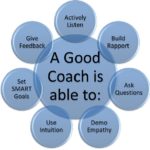
Frequently Asked Questions about Coaching in New York

What is coaching?
Coaching is a relationship-based process designed to build capacity for specific professional dispositions, skills, and behaviors. Coaching is a partnership that supports the development of the coachee’s self-awareness, self-reflection, and self-directed action. Coaching goes beyond the surface of quality practice to explore the roots of what supports children’s growth and development.
The coach’s approach is collaborative and strengths based; the coach works with the coachee through a cyclical process of goal-setting, implementation, and reflection. Coaching is a unique form of professional development in that it is individualized, ongoing and actively supports the translation of newly gained knowledge into practice.
Coaches value experimentation and reflection as primary learning strategies. Coaches adhere to the New York State Coaching Competencies. The competencies guide coaches to be respectful in their interactions.
Who can participate in coaching?
All early childhood professionals could potentially benefit from coaching. Teachers and teaching teams, Directors and Administrators, Family Workers, Assistant Teachers and Aides, at every stage of their career are eligible to work with a coach for professional growth.
How long is the commitment to coaching?
Coaching is a relationship-based process and is effective as a result of the trust that is built between the coach and coachee over time. Many coachees prefer an engagement of a year or more. The length of visits varies, however coachees must be able to meet one-on-one with their coaches for a minimum of 30 minutes as part of each coaching session.
 What should I expect during a coaching visit?
What should I expect during a coaching visit?
Coaches will take time to get to know you at the start of the coaching process. They will observe in your program and ask you about your education, previous experience and overall professional development goals. Coaches will work with you to set a specific, attainable goal to work on together. You will make a plan of action to meet that goal. These actions might include watching the coach model an experience in the classroom, experimenting with a new practice or observing a program together. During individual sessions, you and the coach will take time to reflect on your progress toward your goal. When you have collaboratively decided that you have met your goal, you will either conclude coaching, or choose a new goal to work on together.
Can coaching count toward my required training/professional development hours?
Yes. Coaching hours can be used to meet New York State Office and Family Service training requirements when the coach holds a NYS T-TAP Coach Credential, or is an endorsed NYS Pyramid Model Coach.
Coaching cycles and/or sessions should be documented in the form of a certificate or may be recorded in the applicant’s training record in The Aspire Registry or in the form of a certificate. Documentation must include the names of the coach and coachee, total number of hours of coaching, session dates, the OCFS topic areas and the NYS Core Body of Knowledge Areas.
Coaching and Training Comparison Chart
NAEYC Training and Technical Assistance Glossary
